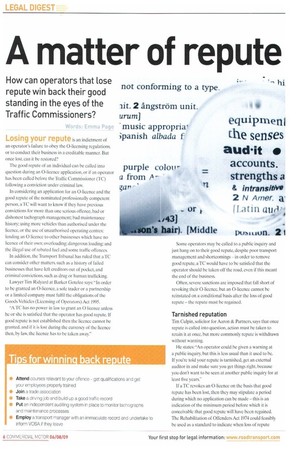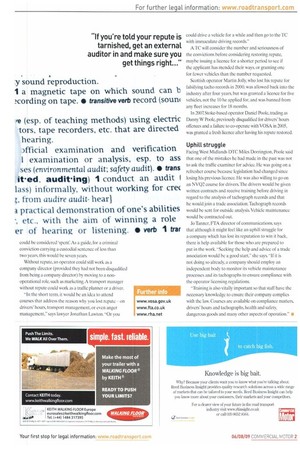A matter of repute
Page 26

Page 27

If you've noticed an error in this article please click here to report it so we can fix it.
How can operators that lose repute win back their good standing in the eyes of the Traffic Commissioners?
Words: Emma Page
Losing your repute is an indictment of an operator's failure to obey the 0-licensing regulations, or to conduct their business in a creditable manner. But once lost, can it be restored?
The good repute of an individual can be called into question during an 0-licence application, or if an operator has been called before the Traffic Commissioner (TC) following a conviction under criminal law.
In considering an application for an 0-licence and the good repute of the nominated professionally competent person. a TC will want to know if they have previous convictions for more than one serious offence, had or dishonest tachograph management; bad maintenance history; using more vehicles than authorised under the licence, or the use of unauthorised operating centres; lending an 0 licence to other businesses which have no licence of their own; overloading; dangerous loading: and the illegal use of rebated fuel and some traffic offences.
In addition, the Transport Tribunal has ruled that a TC can consider other matters, such as a history of failed businesses that have left creditors out of pocket, and criminal convictions, such as drug or human trafficking.
Lawyer Tim Ridyard at Barker Gotelee says: "In order to be granted an 0-licence, a sole trader or a partnership or a limited company must fulfil the obligations of the Goods Vehicles (Licensing of Operators) Act 1995.
"A TC has no power in law to grant an 0 licence unless be or she is satisfied that the operator has good repute. If good repute is not established then the licence cannot be granted, and if it is lost during the currency of the licence then, by law, the licence has to be taken away" Some operators may be called to a public inquiry and just hang on to their good repute, despite poor transport management and shortcomings — in order to remove good repute, a TC would have to be satisfied that the operator should be taken off the road, even if this meant the end of the business.
Often, severe sanctions are imposed that fall short of revoking their 0-licence, but an 0-licence cannot be reinstated on a conditional basis after the loss of good repute — the repute must be regained.
Tarnished reputation
Tim Culpin, solicitor for Aaron & Partners, says that once repute is called into question, action must be taken to retain it at once, but more commonly repute is withdrawn without warning.
He states: "An operator could be given a warning at a public inquiry but this is less usual than it used to be. If you're told your repute is tarnished, get an external auditor in and make sure you get things right, because you don't want to be seen at another public inquiry for at least five years."
If a TC revokes an 0-licence on the basis that good repute has been lost, then they may stipulate a period during which no application can be made — this is an indication of the minimum period before which it is conceivable that good repute will have been regained. The Rehabilitation of Offenders Act 1974 could feasibly be used as a standard to indicate when loss of repute
could be considered 'spent: As a guide, for a criminal conviction carrying a custodial sentence of less than two years, this would be seven years.
Without repute, an operator could still work as a company director (provided they had not been disqualified from being a company director) by moving to a nonoperational role, such as marketing. A transport manager without repute could work as a traffic planner or a driver.
"In the short term, it would be an idea to attend courses that address the reason why you lost repute on drivers' hours, transport management, or even anger management," says lawyer Jonathan Lawton. "Or you could drive a vehicle for a while and then go to the TC with immaculate driving records."
A TC will consider the number and seriousness of the convictions before considering restoring repute, maybe issuing a licence for a shorter period to see if the applicant has mended their ways, or granting one for fewer vehicles than the number requested.
Scottish operator Martin Jolly, who lost his repute for falsifying tacho records in 2000, was allowed back into the industry after.four years, but was granted a licence for five vehicles, not the 10 he applied for, and was banned from any fleet increases for 18 months.
In 2007, Stoke-based operator Daniel Poole, trading as Danny W Poole, previously disqualified for drivers' hours offences and a failure to co-operate with VOSA in 2005, was granted a fresh licence after having his repute restored.
Uphill struggle
Facing West Midlands DTC Miles Dorrington, Poole said that one of the mistakes he had made in the past was not to ask the traffic examiner for advice. He was going on a refresher course because legislation had changed since losing his previous licence. He was also willing to go on an NVQ2 course for drivers. The drivers would be given written contracts and receive training before driving in regard to the analysis of tachograph records and that he would join a trade association. Tachograph records would be sent for outside analysis. Vehicle maintenance would be contracted out, Jo Tanner, FTA director of communications, says that although it might feel like an uphill struggle for a company which has lost its reputation to win it back, there is help available for those who are prepared to put in the work. "Seeking the help and advice of a trade association would be a good start," she says. "If it is not doing so already, a company should employ an independent body to monitor its vehicle maintenance processes and its tachographs to ensure compliance with the operator licensing regulations.
-Training is also vitally important so that staff have the necessary knowledge to ensure their company complies with the law. Courses are available on compliance matters, drivers' hours and tachographs, health and safety, dangerous goods and many other aspects of operation."




































































































































